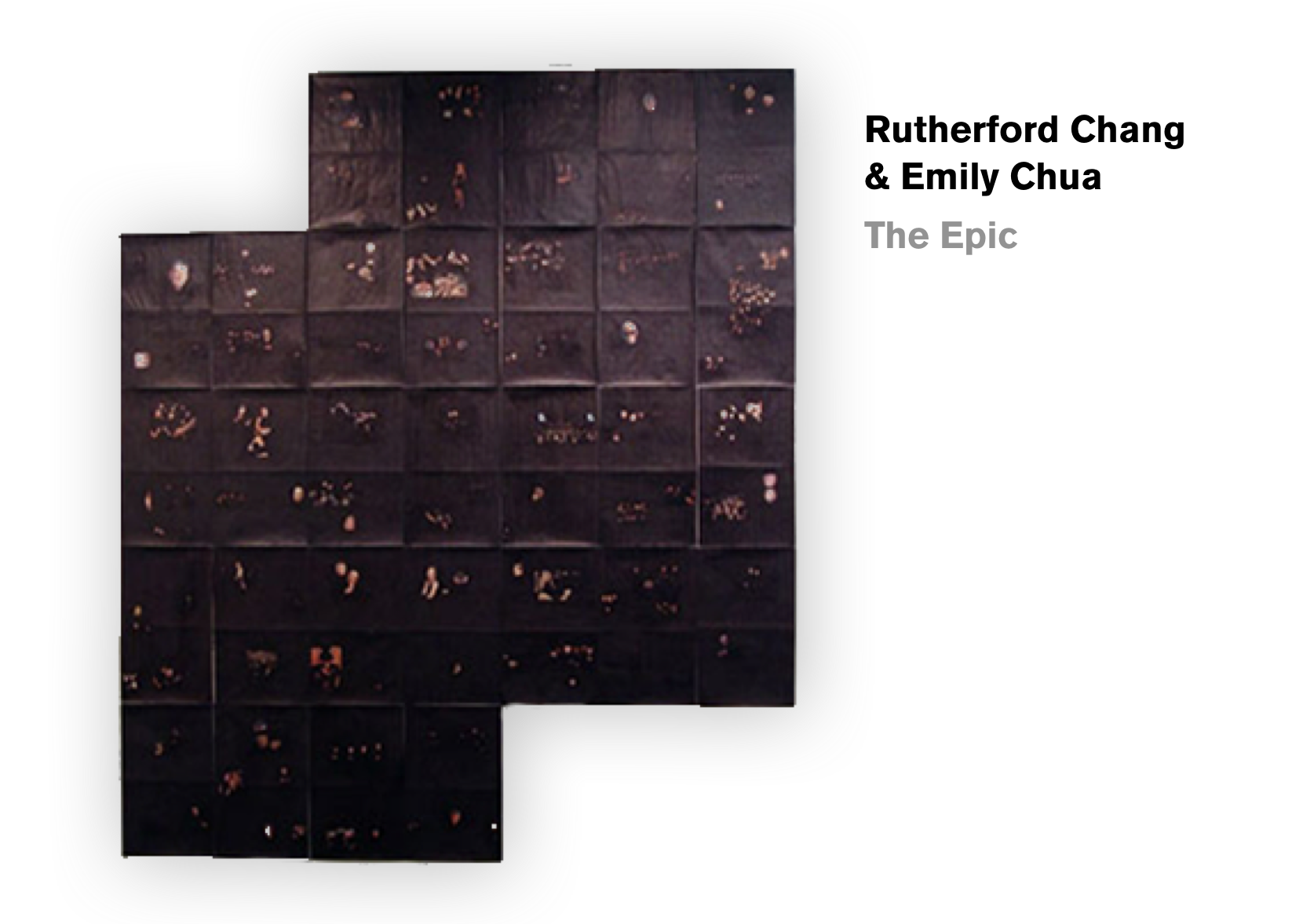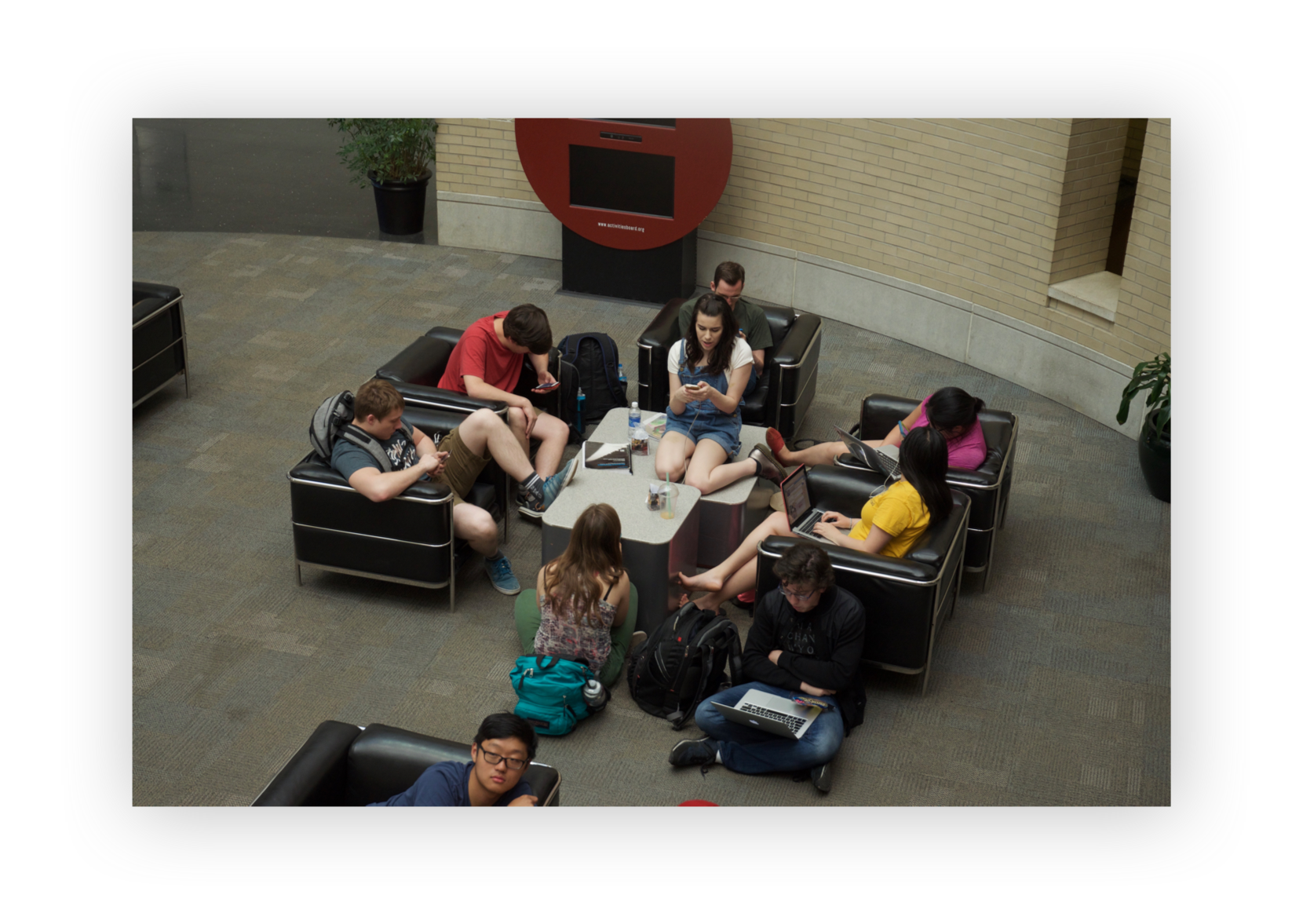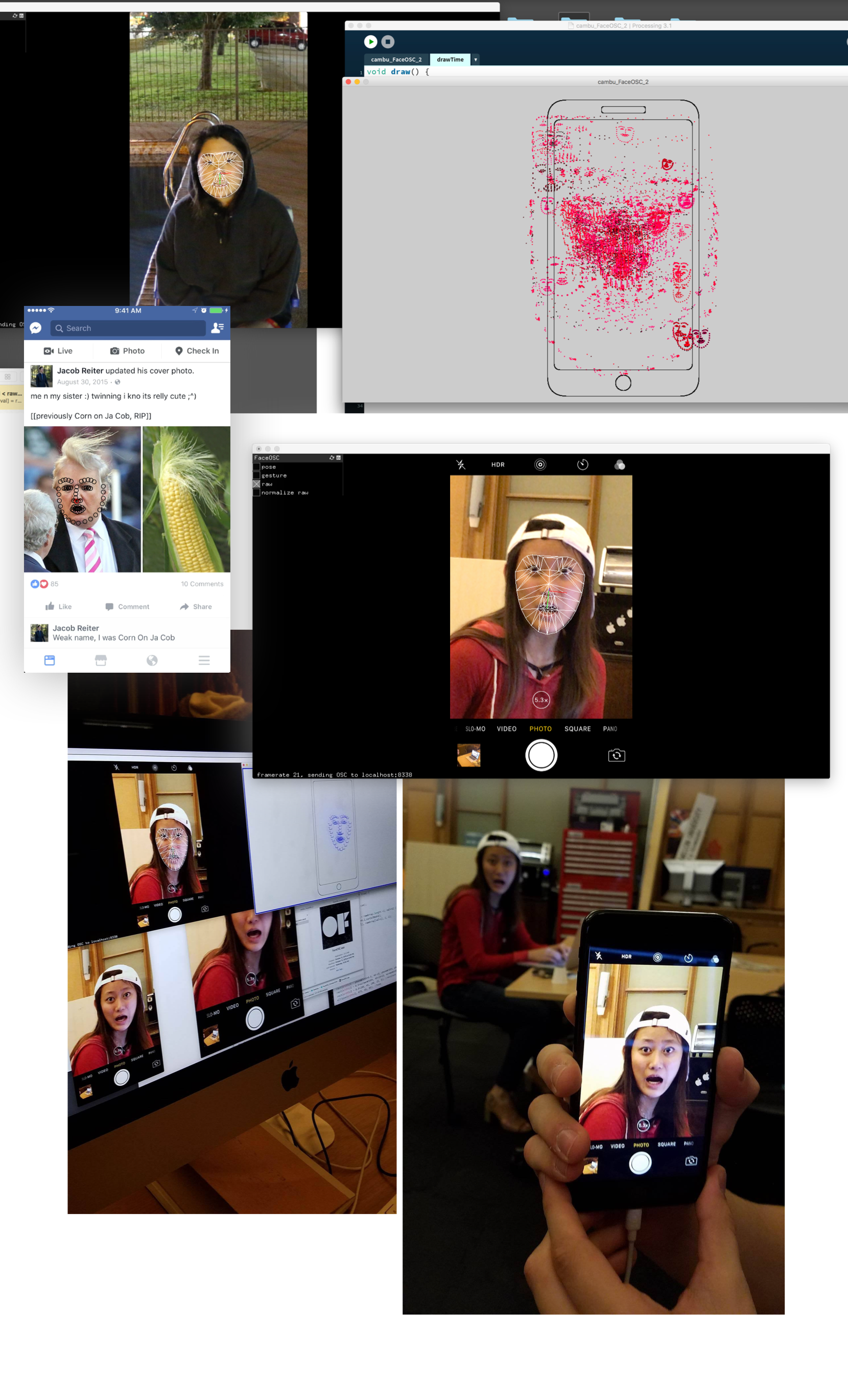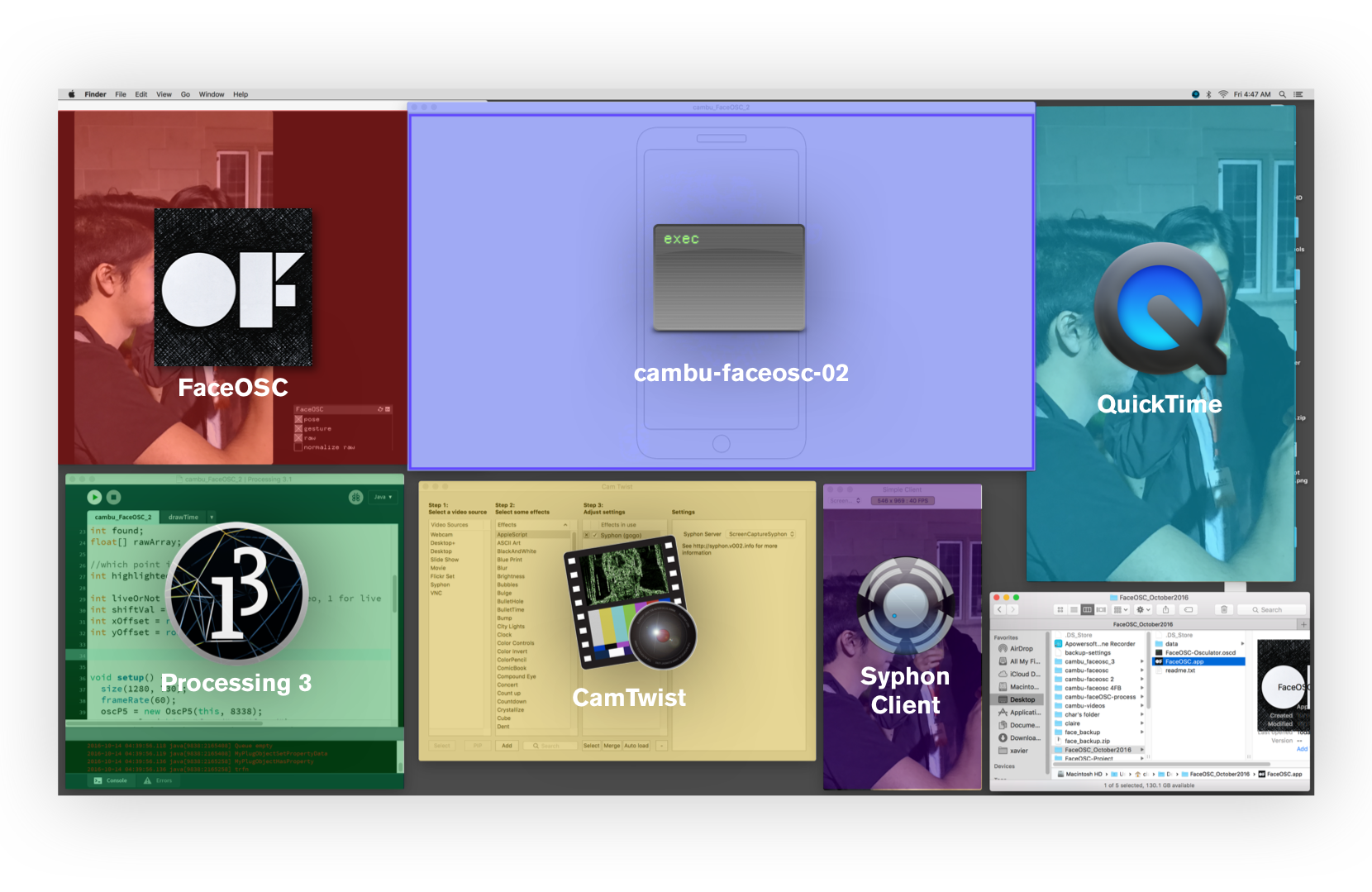cambu-faceosc
Humans look at real faces in the real world every day. But since the advent of smartphone technology, people have been spending increasing amounts of time looking at phone screens while out in public, even around other ‘real’ people. This “issue” has been the subject of a series of artist investigations and conversations within popular culture. I’ve found many of these pieces contain truth, but often whitewash or don’t delve into the actual reason(s) we’re so interested in looking at our phones. I was interested in tackling that situation my piece.
PROCESS
THE PIPELINE
To enable the live capturing of my iPhone Screen, I constructed a multi-piece graphics pipeline. The structure is as follows:
- I use Quicktime to capture video from iPhone screen,
- Screen Capture Syphon to capture the QuickTime window’s contents and make it available to Syphon clients,
- Syphon Client to monitor the Syphon server content,
- CamTwist to recast the Syphon server content as a system webcam device,
- FaceOSC to interoperate the video information and generate RAW data for Processing 3.
The below work is an interesting piece of ‘selective focus’ that Golan pointed out to me when I showed him an iteration of project. The work is an entire year of New York Times covers where everything except people’s faces are blacked out.

Full Code Embed
// a template for receiving face tracking osc messages from
// Kyle McDonald's FaceOSC https://github.com/kylemcdonald/ofxFaceTracker
// further adapted by Marisa Lu
// adapted by Kaleb Crawford
// 2012 Dan Wilcox danomatika.com
// for the IACD Spring 2012 class at the CMU School of Art
// adapted from from Greg Borenstein's 2011 example
// http://www.gregborenstein.com/
// https://gist.github.com/1603230
import oscP5.*;
OscP5 oscP5;
import processing.video.*;
import gab.opencv.*;
import java.awt.Rectangle;
Capture cam;
//Movie cam;
// num faces found
int found;
float[] rawArray;
//which point is selected
int highlighted;
int liveOrNot = 1 ; //0 for recorded video, 1 for live
int shiftVal = 465;
int xOffset = round(0.1*width);
int yOffset = round(0.1*height);
void setup() {
size(1280, 730);
frameRate(60);
oscP5 = new OscP5(this, 8338);
oscP5.plug(this, "found", "/found");
oscP5.plug(this, "rawData", "/raw");
String[] cameras = Capture.list();
if (cameras.length == 0) {
//println("There are no cameras available for capture.");
exit();
} else {
for (int i = 0; i < cameras.length; i++) {
//println(cameras[i]);
}
cam = new Capture(this, 1024, 576, cameras[0]);
cam.start();
}
}
//void keyPressed() {
// if (keyCode == RIGHT) {
// highlighted = (highlighted + 2) % rawArray.length;
// }
// if (keyCode == LEFT) {
// highlighted = (highlighted - 2) % rawArray.length;
// if (highlighted < 0) {
// highlighted = rawArray.length-1;
// }
// }
//}
void draw() {
//background(255, 255,255, 50);
fill(255, 255, 255, 7);
int border = 5;
strokeWeight(border);
rect(border, border, width-border*2, height-border*2);
int timeNowSinceStart = millis() % 2555;
float curColMod = map(timeNowSinceStart, 0, 2555, 0, 255);
//drawPhoneFrame();
//if (cam.available() == true) {
// cam.read();
//}
//set(xOffset, yOffset, cam);
if (found > 0) {
for (int val = 0; val < rawArray.length -1; val+=2) {
//function that changes stroke color if it been more than X time since last called
chnageColIfBreak(curColMod);
ellipse(rawArray[val], rawArray[val+1], 1, 1);
}
}
}
void drawPhoneFrame() {
strokeWeight(1);
int phoneWidth = 345;
int phoneHeight = 675;
int screenWidth = 315;
int screenHeight = 570;
//DRAW PHONE
stroke(0, 0, 0);
rect(width/2 - phoneWidth*0.5, 45-15, phoneWidth, phoneHeight, 45); //phone frame
rect(width/2 - 0.5*screenWidth, 45+15+15, screenWidth, screenHeight, 15); //phone screen
rect(width/2 - 0.5*100, 45, 100, 15, 5); //earpiece
ellipse(width/2, 675, 35, 35); //home
}
float currentMilVal = 0;
float prevMilVal = 0;
float someVal = 285; //this 1000 miliseconds or one second
int faceIncre;
void chnageColIfBreak(float curColMod) {
currentMilVal = millis();
if (currentMilVal - prevMilVal < someVal) {
//the time between OSC face grabs has not been long enough to change the colour
// aka, it just relocked a face, didn't switch to a new face
} else {
faceIncre++;
int curSelect = faceIncre % 3;
if (curSelect == 1) { // RED
drawPhoneFrame();
stroke(17, 45, 200 * (millis()%1000)/100);
//stroke(curColMod*1.2, curColMod*0.8, curColMod*0.5);
//println(curColMod*1.2 + "//" + curColMod + "//" + curColMod);
} else if (curSelect == 2) { // GREEN
drawPhoneFrame();
stroke(32, 165, 50 * (millis()%1000)/100);
//stroke(curColMod*0.1, curColMod*1.2, curColMod*0.3);
} else { // curSelect == 3, in this case BLUE
drawPhoneFrame();
stroke(120, 78, 245 * (millis()%1000)/100);
//stroke(curColMod/8, curColMod/2, curColMod*1.65);
}
//println(faceIncre + " " + curSelect);
}
prevMilVal = currentMilVal;
}
/////////////////////////////////// OSC CALLBACK FUNCTIONS//////////////////////////////////
public void found(int i) {
//println("found: " + i);
found = i;
}
public void rawData(float[] raw) {
//println("raw data saved to rawArray");
rawArray = raw;
if (liveOrNot == 0) {
for (int x = 0; x < rawArray.length; x = x + 2) {
rawArray[x] = rawArray[x] + shiftVal;
}
}
}


